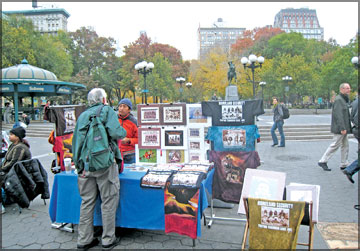Catch in the catchphrases
 Who owns catchphrases? The question came to my mind when I read that
Hollywood actor Charles Sheen is planning to trademark some of his
catchphrases. Who owns catchphrases? The question came to my mind when I read that
Hollywood actor Charles Sheen is planning to trademark some of his
catchphrases.
Paris Hilton had applied for patent rights in 2005 for the
catchphrase ‘That’s Hot’, and in 2010 she managed to get a settlement
from Hallmark for using this phrase. By ‘That’s Hot’ she means ‘That’s
Cool’ and that’s how the catchphrase becomes hot.
‘Three-peat’ was trademarked by Pat Riley in 1988, when Los Angeles
Lakers expected to win the NBA championship for the third time in
succession. They failed in winning it, but they won the claim when the
Chicago Bulls wanted to use the phrase in 1993.
Michael Duffer, boxing and wrestling announcer holds the trademark
for ‘Let’s get ready to rumble’ and earned good money when others wanted
to use the catchphrase to promote their own business.
|

Copies of Fighting Terrorism |
It is not only individuals but organizations too use such trademarks,
like Las Vegas Conventions and Visitors Authority, who trademarked,
‘Your Vegas is showing’. Before that they had ‘What happens here, stays
here’. Apple computers won a trademark for ‘There’s an App for That’.
‘A catch phrase is an expression usually popularized through repeated
use by a real person or fictional character.’ Yet today a catchphrase
has become a trademark, to be monopolized by a person or a business
organization and then the consumer has to pay for reading or hearing it.
There are catchphrases like ‘submarine patents’, used by those
involved in debates about patent rights. A submarine patent is a ruse
used by patent rights applicants to prolong their patent validity and
could be used even to patent catchphrases. Another is ‘Eco-tourism’. In
the name of eco-tourism we are doing more harm to our eco-system than by
traditional tourism.
If we are to minimize ecological impact, even a leaf from a tree in
the wilderness should not be plucked. But we cut down trees to build
‘log cabins’, to clear foot paths, block the natural paths used by
animals and we disturb the peaceful co-existence of the fauna and flora
and the rural communities.
Meanings also could change. For Harry Truman ‘The Buck stopped here’
because he accepted total responsibility. For Truman the Buck probably
meant a knife with buckhorn handle, used by poker players to indicate
who was to deal, and ‘passing the buck’ was to pass the deal to the next
player. Buck also means the Dollar and today in some parts of the world
the buck stops when it ends up in someone’s pocket.
Not all catchphrases can be trademarked, as we can see in ‘A
Dictionary of Catchphrase - from the sixteenth century to the present
day’ by Eric Partridge (1977). Partridge begins the introduction with a
quote from R. L. Stevenson, ‘Man is a creature who lives not by bread
alone, but principally by catchwords’. (Virginibus Puerisque. 1881)
These phrases are free for use by anyone, and those who first invented
or used them did not earn a cent from there creative ideas.
‘Accidentally on purpose’, ‘Believe it or not’, ‘Big Brother is
watching you’, are a few examples from the dictionary.
Some phrases have become so overused that they are already fading
away, like ‘Customer is always right’, which today’s businessmen do not
accept.
Catchphrases have become a major publicity weapon ever since the
world was taken over by big business. Some of these phrases have become
so common that consumers not only identify the brand from the phrase,
but sometimes consider the phrase as the brand, like ‘Intel inside’.
Catchphrases are found on T-shirts too, and sometimes they can be
used to convey a message. Like what a native American was selling at
Union Square, New York, which had a picture of Jeronimo with the phrase
‘Fighting Terrorism since 1492’. Americans are still waiting for Obama
for ‘the Change’.
Sarah Palin’s ‘Don’t retreat, Reload’, backfired, after the Tucson,
Arizona shooting incident. This is a danger faced by politicians and
businessmen when they get carried away with a catchphrase with a catch
in it. Then we get into a ‘Catch 22’ situation, like John Yossarian.
When one car claims it is the ultimate driving machine, where does it
leave all other cars? When one business claims they keep the nation
moving, a safety match manufacturer could claim they keep the nation on
fire.
Creating catchphrases for business is also a good business today, by
people who have a way with words, for people who do not have much of an
imagination. There are also websites that help people make their own
lines, and software which generates catchphrases.
How ethical is it for a business organization to monopolize a word or
a phrase, is subject to debate. Specially when the phrase used is very
common, and could apply to many situations, and specifically for a
product or service. Also when such phrases would have been in use for a
long time, by writers, radio and television announcers and politicians.
Words in the language we use for communication belong to all of us,
and we should have the freedom to use any word combination in our
speech, in our writings or in our songs. It has been established that
human beings think alike, and have been thinking alike from the time he
evolved in to a thinking being with imagination, from the way he
invented stone tools, the use of fire, the use of the wheel.
‘The bottom line is’, ‘that at the end of the day’, ‘we need a
paradigm shift’. |



